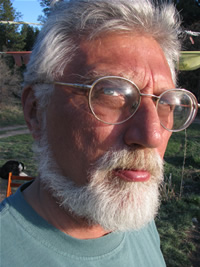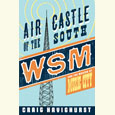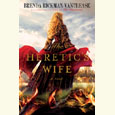Writ Large
Intrepid adventurer and National Book Award winner Bob Shacochis talks with Chapter 16
Perhaps the best way to understand Bob Shacochis is to know that, in Bob’s image of heaven, God is a bitch—an Irish Setter, to be specific. At Bob’s house, dogs own the bed and most of the furniture, there’s no leash law, walks happen every day—at least three times and always on schedule—and dogs eat first, frequently, and often right from their master’s plate at the dinner table. There’s no hidden metaphor or analogy here; these are the facts. How you respond to this bit of knowledge would likely determine how well you’d get along with Bob Shacochis. It will certainly go a long way toward determining how much use he has for you.
I met Bob Shacochis in the winter of 2001, when I was a student in his creative nonfiction workshop at the Florida State University Graduate Creative Writing Program. Bob was (and remains) a breed apart, one of the last survivors of the glory days of magazine fiction and feature writing, the age when writers were bold and swaggering and confident and even a little dangerous—a ruddy, bearded wild man of the mountains, an intrepid travel writer and war correspondent, and a consummate prose stylist.
 He’s also a brilliant and demanding teacher who has nurtured and opened publishing doors to a bevy of former students—Colin and Kathryn Harrison, Lucy Grealey, Tom Bissell, and Jo Anne Beard, to name only a few—in his various gigs at the Iowa Writers’ Workshop, the Bennington Writing Seminars, Florida State, and elsewhere. From the moment he enters the classroom, his students are in awe of Bob, who matches a blunt, mercurial, not-so-occasionally thorny nature with matchless generosity of spirit and unvarnished commitment to his students, their aspirations, and his standards of literary artistry and truth in language. Those of us who had followed his career on the pages of Outside, Harper’s, GQ, Playboy, and in his story collections and his magnificent novel, knew we were in the hands of master: a remarkable imagination, a passionate and uncompromising critic, and a stylist of Faulknerian virtuosity.
He’s also a brilliant and demanding teacher who has nurtured and opened publishing doors to a bevy of former students—Colin and Kathryn Harrison, Lucy Grealey, Tom Bissell, and Jo Anne Beard, to name only a few—in his various gigs at the Iowa Writers’ Workshop, the Bennington Writing Seminars, Florida State, and elsewhere. From the moment he enters the classroom, his students are in awe of Bob, who matches a blunt, mercurial, not-so-occasionally thorny nature with matchless generosity of spirit and unvarnished commitment to his students, their aspirations, and his standards of literary artistry and truth in language. Those of us who had followed his career on the pages of Outside, Harper’s, GQ, Playboy, and in his story collections and his magnificent novel, knew we were in the hands of master: a remarkable imagination, a passionate and uncompromising critic, and a stylist of Faulknerian virtuosity.
Fittingly, it was Faulkner who once famously suggested that a writer must teach himself that “the basest of all things is to be afraid: and, teaching himself that, forget it forever, leaving no room in his workshop for anything but the old verities and truths of the heart, the universal truths lacking which any story is ephemeral and doomed—love and honor and pity and pride and compassion and sacrifice.” Bob Shacochis is an exemplar of this maxim. His work and his life are, in a word, fearless.
Shacochis has sailed the open Atlantic and the Caribbean; surfed the breaks of far-flung South American beaches; touched the summit of Mount Ararat, the great volcano of the Near East, where Noah’s Ark purportedly came to rest; hiked the hinterlands of Haiti with Green Berets in the midst of a coup d’état; watched from the deck of a US aircraft carrier as the jetfighters blasted off to rain fire in Kosovo; and seen the fabled Buddhist kingdom of Mustang, three thousand meters above sea level on the border of Nepal and Chinese-occupied Tibet, all but forbidden to outsiders. He’s humped through the elephant- and lion-infested savannah of Gorongosa Park in Mozambique. He’s journeyed to Portugal to gather the stories of the elderly rangers, those who tended the park before the end of Portugal’s colonial rule and the decades of civil war and poaching that decimated Gorongosa’s wildlife population. He’s even been to Margaritaville, to write a feature article on Jimmy Buffett for Men’s Journal.
And he has brought all of these places and the people who populate them to life in language that is dizzyingly elaborate in style and yet crystalline in insight. His richly drawn, irrepressibly energetic first-hand accounts of the wild places of the world and the people who dwell in them are equaled only by their reinvention in fiction of singular vision, fiction that has been envied and honored with countless accolades: his first collection of stories, Easy in the Islands, won the 1986 National Book Award for First Fiction; his first novel, Swimming in the Volcano, was a finalist for the fiction prize in 1993. His second story collection, The Next New World, earned him the Rome Prize from the American Academy of Arts and Letters. The Immaculate Invasion (soon to be reprinted in a new edition by Grove Atlantic), the culmination of his experiences reporting for Harper’s on the U.S. invasion of Haiti after the coup deposing Jean Bertrand Aristide in 1994, was a New York Times Notable Book and a finalist for The New Yorker Award for Best Nonfiction.
But despite his many honors and the undeniably adventurous character of his life and work, Bob’s fearlessness has been most evident in his honesty, in his willingness to turn his writer’s eye inward. Bob has taken his readers around the world, but also into his kitchen, into his bliss with his remarkable companion, Barbara “Catfish” Petersen (immortalized in Bob’s “Dining In” columns for GQ and his collection Domesticity as “Miss F.”), and so movingly into their shared hopes and sorrows, showing us that writing—and people—need not be adventurous to be heroic.
“I’m like a street musician who plays requests for a buck, and I’m not about to waste a second of my life sitting around being bored.”
For Bob Shacochis, “voice, ultimately, is literature. The exploration of humanity through language. Voice in its orbit through thematic gravity most vibrantly carries the endless wonder of a unique self; a living but invisible soul.” This is the voice that says, in the words of Carlos Fuentes, “that humanity does not live in an icy abstraction of the separate, but in the warm pulse of an infernal variety that tells us: we have yet to be. We are in the process of becoming.”
Chapter 16: Much of your writing has been set in or based on experiences in the Caribbean. How did you first encounter this locale, and what led you to center so much of your career around it?
Shacochis: After graduating from college in 1973, I hit the road and ended up living on an island in the southwestern Caribbean, Isla Providencia, which is part of Colombia. I worked with the local spear fishermen for a year, then, out of money, headed back to the States and, determined to head back to the West Indies, joined the Peace Corps as an agricultural journalist and was stationed in St. Vincent and the Grenadines, Barbados, and St. Kitts. The Afro-Caribbean cultures I lived in became, inevitably, the perfect breeding ground for my nascent literary imagination. If it’s true that we write about what we know, then at that time in my life and for the next ten years what I knew best was the West Indies.
Chapter 16: The devastation of the recent earthquake in Haiti has stimulated a seemingly sudden public attentiveness to the longstanding poverty and dysfunction of what has for decades been the poorest nation in the western hemisphere. As one who experienced firsthand the catastrophic living conditions in Haiti during your experiences reporting on the post-coup U.S. invasion in 1994 and your subsequent research writing The Immaculate Invasion, how have you perceived the recent disaster and the response to it?
Shacochis: Haiti has just been made to endure the greatest natural disaster visited upon any single nation in living memory. At the same time, more than half of American households have opened up their wallets to chip in to the staggering amount of humanitarian aid being sent to the island, which we all know has encountered very complex logistical challenges, getting it distributed to the million homeless, helpless people who need it. Too many genuinely decent people have just devoted their lives to doing their best to help Haiti during this catastrophe for me to feel cynical about the entire process, despite its problems.
Chapter 16: You have had and continue to have an enormously diverse and demanding literary career—really three, four, sometimes five careers at once: adventure travel writer, war correspondent, fiction writer, op-ed columnist, food writer, personal essayist, creative-writing professor. How do you manage the various demands of these separate but complementary directions in your literary life?
Shacochis: The only rock solid demand I have in my life is taking good care of my dogs. I don’t make the distinctions between one aspect of my career as a writer and any other aspect. Everything just happens as it happens, one day at a time, working diligently and trying to fill my days and pay my bills as best as I can. Essentially, I have no loyalty toward any particular genre or form; I’m like a street musician who plays requests for a buck, and I’m not about to waste a second of my life sitting around being bored.
Chapter 16: Recently, you reported for Outside on the Carr Foundation’s efforts to rehabilitate Gorongosa National Park in Zimbabwe after years of poaching and the devastation of that country’s civil war. The success of that piece has earned you a continuing assignment with the Carr Foundation. Can you describe your work in Mozambique and the Carr Foundation’s efforts there?
Shacochis: The American philanthropist Greg Carr asked me last year if I would interview any living person we could track down who was involved in the creation of Gorongosa National Park in the 1960s or the destruction of the park in the 70s, 80s and 90s. The idea was to create an oral archive of the park’s history and then use that to create a character-driven narrative for a museum exhibit about Gorongosa that would tour the world and then be permanently installed in Mozambique. I’ve spent a lot of time in the past year talking with legendary great white hunters living out their last days in Portugal and former guerilla fighters in Africa.
Chapter 16: Your first big successes as a journalist and fiction writer came in the mid-1980s. Since then, you have published countless stories and feature articles in many high-circulation magazines and have published five books and edited several others. You have also watched the magazine and book publishing industries evolve dramatically, falling recently into what some might call a state of peril. Do you foresee dire consequences in the near future for the publishing industry? Is there any hope for the prosperity and sustenance of literary life in the U.S.?
“The literary village in America will survive, even if at the moment it looks more and more like a homeless camp under an overpass connecting Wall Street with Main Street.”
Shacochis: The publishing industry, like every other media or arts-related industry in the United States, is going through a tumultuous transitional period right now as it tries to adjust to new technologies and delivery systems and competition from brainless toys and entertainments in a seriously dumbed-down culture. The literary village in America will survive, even if at the moment it looks more and more like a homeless camp under an overpass connecting Wall Street with Main Street. Just because bloggers are stupid enough to write without pay doesn’t mean serious writers can’t continue to make a living. The only thing that will never be democratized is excellence. Anybody who achieves excellence in what they aspire to is, ipso facto, an elite member of their society, and blessings upon them.
Chapter 16: Considerable debate exists about the impact of digital books and readers on the publishing industry. What is your opinion of the rise of digital books, and how do you foresee its influence on U.S. literary culture?
Shacochis: Don’t know, don’t care. Even if it dwindles to a precious boutique commodity, print—ink on paper—is forever.
Chapter 16: Your acclaimed 1999 account of the U.S. invasion of Haiti, The Immaculate Invasion, is about to be reissued after being out of print for several years. How did that come about?
Shacochis: Tina Brown’s web-zine, The Daily Beast, asked me to write an op-ed piece about Clinton’s legacy in Haiti. I sent a copy of the piece to my agent and to my editor, Morgan Entrekin, at Grove/Atlantic, with a note saying, I know the chances are slim to none, but would you consider reissuing The Immaculate Invasion, which Penguin ripped out of print in 2002 in revenge for me leaving Viking/Penguin to search for a more felicitous home for my work. Even before he learned that I had control of the rights to the book, which made everything easy, it only took Morgan one minute to agree to reissue it, and he asked me to write an afterword, which I have just finished. Grove/Atlantic will pitch it out in a e-book format sometime next month, but they will also be printing a brand new paperback edition, a decision which has earned them my endless and undying gratitude and, should they ask for it, servility.
Chapter 16: What’s next for Bob Shacochis?
Shacochis: Dinner and a cognac.
Bob Shacochis will read from his work at 5:30 p.m. on Monday, March 1, in Pfeffer Auditorium on the campus of Montgomery Bell Academy in Nashville. The event is free and open to the public.





